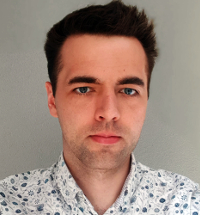Meet Our Team

prof. Jacek Tabor
Project Leader

prof. Maciej A. Nowak
Team Leader
Physics group

prof. Tadeusz Marek
Team Leader
Cognitive group

prof. Daniel Wójcik
Team Leader
Neuro group

dr hab. Igor Podolak
Team Leader
Machine-learning group

dr hab. inż. Paweł Oświęcimka
Team Leader
BioDataSci group

dr hab. inż. Tomasz Trzciński
Team Leader
InfoTech group

prof. Tadeusz Marek
Team Leader

dr Magdalena Fąfrowicz
Research Senior

dr Magda Gawłowska
Research Junior

Bartosz Bohaterewicz
Research Assistant

Anna Ceglarek
Research Assistant

Natalia Golonka
PhD Student

Anna Sobczak
PhD Student

Aleksandra Żyrkowska
PhD Student

prof. Maciej A. Nowak
Team Leader

prof. Romuald Janik
Research Senior

dr Jacek Grela
Research Junior

dr Przemysław Witaszczyk
Research Junior

dr hab. Igor Podolak
Team Leader

dr Łukasz Struski
Research Junior

dr Marek Śmieja
Research Junior

Aleksandra Nowak
PhD Student

Igor Sieradzki
PhD Student

Maciej Wołczyk
PhD Student

prof. Daniel Wójcik
Team Leader

dr Jakub Dzik
Research Junior

dr Michał Lenarczyk
Research Junior

dr Bartosz Jura
Research Junior

Ziemowit Sławiński
PhD Student

dr hab. inż. Tomasz Trzciński
Team Leader

dr Karol Jerzy Piczak
Research Junior

dr Przemysław Spurek
Research Junior

dr Bartosz Zieliński
Research Junior

Klaudia Bałazy
PhD Student

Witold Oleszkiewicz
PhD Student

Michał Sadowski
PhD Student

dr hab. inż. Paweł Oświęcimka
Team Leader

dr Zbigniew Drogosz
Research Junior

dr Jeremi Ochab
Research Junior

dr Pritpal Singh
Research Junior

dr Wojciech Tomczyk
Research Junior

dr Marcin Wątorek
Research Junior

Tomasz Stanisz
PhD Student

Marcin Tutajewski
PhD Student